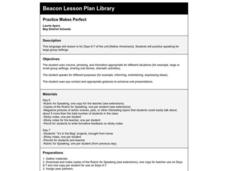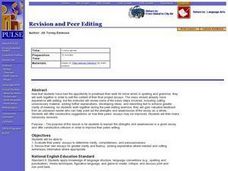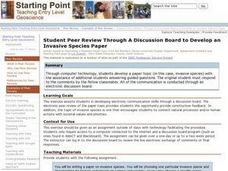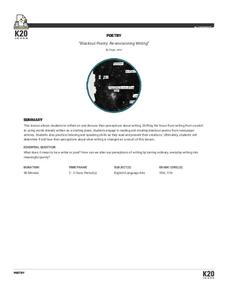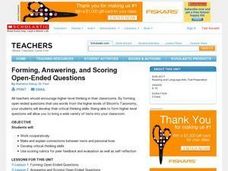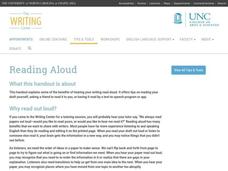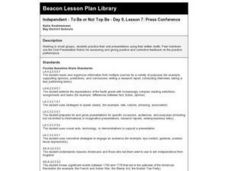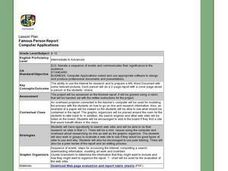EngageNY
Grade 10 ELA Module 2: Unit 1, Lesson 12
Sticks and stones may break bones, but words matter. Scholars analyze words in paragraphs from Martin Luther King Jr.'s "Letter from Birmingham Jail." They use new vocabulary words and discuss how King's words develop and support his...
Missouri Department of Elementary
What Color is Your Apple?
Build your classroom community with an activity that uses apples to examine oneself and their classmates. Participants draw four large apples on blank paper then exchange them within a small group. Group members write a character trait...
Curated OER
Practice Makes Perfect
And the consensus says...Teach your class to use peer feedback to refine public speaking skills. They cut out a magazine picture and develop an oral story about it to present to the class. They share several meaningful objects with the...
Curated OER
Peer writing evaluation (myth)
Students compose myths. In this creative writing lesson students use their knowledge of the features of myths to compose their own, then share with a peer for feedback.
Curated OER
Language Arts: Revision and Peer Editing
Students are able to evaluate their peers' essays to determine clarity, completeness, and persuasiveness. They are able to revise their own essays for greater clarity and fluency, adding explanation where needed and cutting extraneous...
Curated OER
Student Peer Review Through a Discussion Board to Develop an Invasive Species Paper
Students develop electronic communication skills through a discussion board while peer reviewing a paper on invasive species. Students work in groups of three to provide constructive feedback on a classmate's paper.
Curated OER
Writing: Peer Revision
Students drill and practice writing/reading skills through the peer-editing process while writing an autobiography. They become more comfortable sharing their writings with others, offering feedback comments and encourage others to work...
Curated OER
Revision is Part of the Writing Process: Peer Workshops
Twelfth graders go through the peer editing process by reading each other's work and talking about it. They realize revision is part of the process of writing poetry.
Curated OER
Peer and Self-evaluation in Spoken Tests: Tools and Methods
Students, in groups, each take a different role and are to either ask or answer questions. They explore how to effectively evaluate themselves and others.
EngageNY
Developing Reading Fluency: Beginning the End of Unit 2 Assessment
Third graders continue to develop their reading fluency in preparation for their assessment in the tenth lesson plan of this unit. Young readers are provided with a short passage on Helen Keller, which they use while working in pairs...
Curated OER
The Learning Network: Re-envisioning Classic Stories
Readers reflect on enjoyable stories they know, brainstorm criteria that make a story "good," analyze a New York Times article about innovative children's performances, re-envision classics on their own, and peer edit drafts. Use this as...
K20 Learn
Blackout Poetry: Re-Envisioning Writing
Shed light on the beauty of language with a great poetry activity. After learning about Austin Kleon's blackout poetry model, pupils respond to some of his poetry and use it as a model to produce their own. Young writers also share their...
Curated OER
Winter Wonderland: Internet Literature Project
Students, using the Internet, communicate with peers around the world about winter-themed books. They study authors, write book reviews, re-write endings, interview book characters, create scene dioramas, paint murals, and write...
Curated OER
Quotation Response Speech: Public Speaking Skills
Improve high schoolers' public speaking with an engaging activity. Class members select three personally relevant quotes from a list. They then write a short speech for each quote, explaining how the quotes are personally relevant....
CK-12 Foundation
Equivalent Fractions
An interactive made up of five questions tests scholars' knowledge of equivalent fractions. Two fraction circles with moveable parts assist mathematicians in finding solutions. Questions are multiple-choice with one discussion.
CK-12 Foundation
Division of Fractions: Stacking Berets
Seven questions make up an interactive designed to boost mathematician's skills in dividing whole numbers by mixed fractions. Practice comes with a visual aid with movable parts. Questions types include fill in the blank,...
Curated OER
Forming, Answering, and Scoring Open Ended Questions
High schoolers explore higher level thinking. They develop their critical thinking skills by answering open ended questions. Students work cooperatively and make and explain connections between texts and their personal lives. High...
Bonneville
Construction Progress and Obstacles
Overcoming obstacles is how one grows. In groups, scholars discuss their progress in constructing their solar cells and talk about any obstacles they may be encountering. They first work in heterogeneous groups to see different types of...
University of North Carolina
Reading Aloud
Warning: reading your paper aloud may cause bystanders to think you're talking to yourself. However, as the 14th installment of 24 in the Writing the Paper series from UNC explains, it is one of the best strategies for revision. Through...
Curated OER
Independent - To Be or Not Top Be: Press Conference
Fourth graders deliver an oral presentation on the American war for independence to small groups. They use a rubric to give each other peer feedback on the strengths and weaknesses of their presentation.
Curated OER
Career Visualization
Students examine the different career choices available. In this career choice lesson students complete several activities including a visualization lab.
Curated OER
The Writing Process
Students engage in the various steps involved in the writing process. The lesson plan is written as a guide for the teacher to write more in depth lesson plans for specific activities. This is a good model plan to follow.
Curated OER
Famous Person Report - Computer Applications
Young scholars choose famous person to research online, use at least two different sources to find information, prepare rough drafts and document sources, meet in groups for peer feedback, review with teacher, and turn in final report.
EngageNY
Group Discussions and Revision: Editorial Essay
Great minds think aloud! Pupils participate in the Fishbowl protocol, discussing their opinions about the Mary River mine proposal. As they share their thoughts, peers provide feedback about their thesis and supporting ideas.




